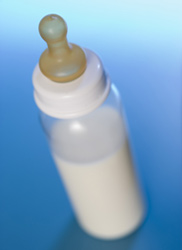Baby Bottle Syndrome
What if you took your three year old child to the dentist for the first time and the dentist told you, “Mrs. Smith, your daughter has 15 cavities that we need to fill.” What would your response be? Disbelief? Shock? Dismay? Maybe even a combination of all three?
What if you found out that the reason for this was Baby Bottle Syndrome – a condition you could have prevented had you simply followed a few rules with your child from the time he or she was an infant? What would you feel then? Guilt? Remorse?
What is Baby Bottle Syndrome?

Baby Bottle Syndrome is serious and completely avoidable!
Baby Bottle Syndrome is a condition that occurs when a child’s teeth come into frequent contact with sugars present in milk, fruit juices, formula, sugar water and even breast milk. It most frequently occurs when a child is put to bed with a bottle and the liquids pool in the child’s mouth after he or she falls asleep or when a child is allowed to walk around all day drinking from a bottle.
The liquids in the bottle break down into simple sugars that mix with the bacteria in the child’s mouth, causing tooth decay. The decay is normally found on the upper front teeth and back molars, as the lower teeth are often protected by the child’s tongue.
What Can A Parent Do to Prevent Baby Bottle Syndrome?
The most obvious answer to this question? Don’t allow your child to go to bed with a bottle of anything except water. Other suggestions include:
- Don’t allow your child to walk around with a bottle of milk, formula, juice, juice mixed with water, or sugar water during the day. Instead, give your child a bottle of water or a pacifier.
- Don’t allow your child to nurse continually while sleeping as breast milk will produce the same effect.
- Don’t add any sugar to your child’s food.
- Never dip your child’s pacifier in honey or any other sweet substance.
How Would I Know if My Child Has Baby Bottle Syndrome?
The only clear way to know this is by bringing your child in for a thorough examination, as close to his or her first birthday as possible so that your dentist can determine the presence of any tooth decay, before it gets worse, and provide you with valuable information on how to prevent Baby Bottle Syndrome.
If you’re reading this and have been putting your child to bed with a bottle of anything other than water, or nursing your child while he or she is sleeping, call a participating dentist in your area to discuss your concerns and to schedule an appointment.
It is always better to be proactive in these instances. A dentist will want to determine whether a problem exists so it can addressed before it becomes an even bigger problem. Untreated tooth decay may result in your child’s losing teeth earlier than expected or in extensive, and expensive, dental restorations to save their teeth.

